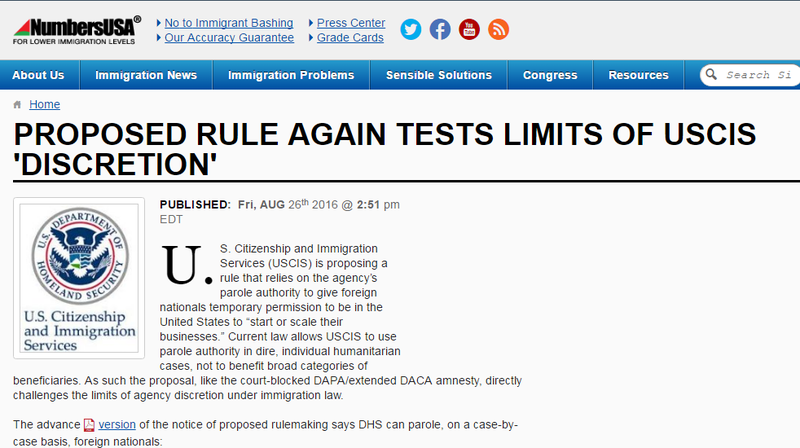Proposed Rule Again Tests Limits of USCIS 'Discretion'
U.S.Citizenship and Immigration Services (USCIS) is proposing a rule that relies on the agency’s parole authority to give foreign nationals temporary permission to be in the United States to “start or scale their businesses.” Current law allows USCIS to use parole authority in dire, individual humanitarian cases, not to benefit broad categories of beneficiaries. As such the proposal, like the court-blocked DAPA/extended DACA amnesty, directly challenges the limits of agency discretion under immigration law.
The advance version of the notice of proposed rulemaking says DHS can parole, on a case-by-case basis, foreign nationals:
- “Who have…ownership interest in the startup (at least 15 percent) and have an active and central role to its operations;
- Whose startup was formed in the United States within the past three years; and
- Whose startup has substantial and demonstrated potential for rapid business growth and job creation, as evidenced by:
- Receiving significant investment of capital (at least $345,000) from certain qualified U.S. investors with established records of successful investments;
- Receiving significant awards or grants (at least $100,000) from certain federal, state or local government entities; or
- Partially satisfying one or both of the above criteria in addition to other reliable and compelling evidence of the startup entity’s substantial potential for rapid growth and job creation.”
Foreign nationals would be allowed to stay in the U.S. for two years and could apply for additional three-year periods “only if the entrepreneur and the startup entity continue to provide a significant public benefit as evidenced by substantial increases in capital investment, revenue or job creation.”
The Washington Times’ Stephen Dinan suggests the Administration “plans to use parole authority to go around normal rules and…(let) wealthy entrepreneurs buy their way in.” Dinan questions whether existing parole authority “is broad enough to cover this type of program” and notes “the Administration couldn’t point to any case where parole had been used to gain entry to the mainland U.S. strictly on future economic prospects.”
The proposal is similar in purpose to the fraud-ridden EB-5 visa program, which gives green cards to foreign nationals who invest as little as $500,000 in a new U.S. company. And like under EB-5, foreign nationals would only need a small commitment in the company (15% stake) to qualify, although some U.S. investment is required.
The p-roposal was released today, so Members of Congress have yet to challenge this new encroachment on their authority. Earlier this year, Senate Judiciary Committee Chairman Chuck Grassley, R-Iowa, and Sen. Mike Lee, R-Utah, called out the Administration’s abuse of advance parole authority in granting a citizen path to illegal aliens with Deferred Action for Childhood Arrivals (DACA) status. If left unchallenged, the Administration could expand its use of parole authority for other classes of beneficiaries before Obama’s term expires.
https://www.numbersusa.com/news/proposed-rule-again-tests-limits-uscis-discretion
Mentions
States
- District Of Columbia
Videos





Subscribe for News
Site Digest
Join Professionals on EB5Projects.com →
Securities Disclaimer
This website is for informational purposes only and does not constitute an offer or solicitation to sell shares or securities. Any such offer or solicitation will be made only by means of an investment's confidential Offering Memorandum and in accordance with the terms of all applicable securities and other laws. This website does not constitute or form part of, and should not be construed as, any offer for sale or subscription of, or any invitation to offer to buy or subscribe for, any securities, nor should it or any part of it form the basis of, or be relied on in any connection with, any contract or commitment whatsoever. EB5Projects.com LLC and its affiliates expressly disclaim any and all responsibility for any direct or consequential loss or damage of any kind whatsoever arising directly or indirectly from: (i) reliance on any information contained in the website, (ii) any error, omission or inaccuracy in any such information or (iii) any action resulting therefrom.



